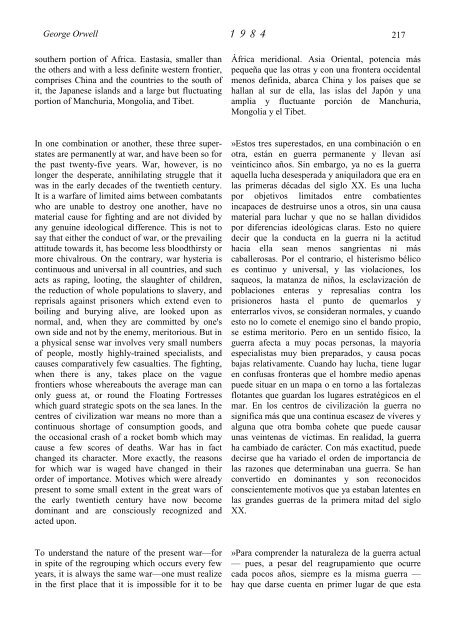Create successful ePaper yourself
Turn your PDF publications into a flip-book with our unique Google optimized e-Paper software.
George Orwell 1 9 8 4<br />
southern portion of Africa. Eastasia, smaller than<br />
the others and with a less definite western frontier,<br />
comprises China and the countries to the south of<br />
it, the Japanese islands and a large but fluctuating<br />
portion of Manchuria, Mongolia, and Tibet.<br />
In one combination or another, these three superstates<br />
are permanently at war, and have been so for<br />
the past twenty-five years. War, however, is no<br />
longer the desperate, annihilating struggle that it<br />
was in the early decades of the twentieth century.<br />
It is a warfare of limited aims between combatants<br />
who are unable to destroy one another, have no<br />
material cause for fighting and are not divided by<br />
any genuine ideological difference. This is not to<br />
say that either the conduct of war, or the prevailing<br />
attitude towards it, has become less bloodthirsty or<br />
more chivalrous. On the contrary, war hysteria is<br />
continuous and universal in all countries, and such<br />
acts as raping, looting, the slaughter of children,<br />
the reduction of whole populations to slavery, and<br />
reprisals against prisoners which extend even to<br />
boiling and burying alive, are looked upon as<br />
normal, and, when they are committed by one's<br />
own side and not by the enemy, meritorious. But in<br />
a physical sense war involves very small numbers<br />
of people, mostly highly-trained specialists, and<br />
causes comparatively few casualties. The fighting,<br />
when there is any, takes place on the vague<br />
frontiers whose whereabouts the average man can<br />
only guess at, or round the Floating Fortresses<br />
which guard strategic spots on the sea lanes. In the<br />
centres of civilization war means no more than a<br />
continuous shortage of consumption goods, and<br />
the occasional crash of a rocket bomb which may<br />
cause a few scores of deaths. War has in fact<br />
changed its character. More exactly, the reasons<br />
for which war is waged have changed in their<br />
order of importance. Motives which were already<br />
present to some small extent in the great wars of<br />
the early twentieth century have now become<br />
dominant and are consciously recognized and<br />
acted upon.<br />
To understand the nature of the present war—for<br />
in spite of the regrouping which occurs every few<br />
years, it is always the same war—one must realize<br />
in the first place that it is impossible for it to be<br />
217<br />
África meridional. Asia Oriental, potencia más<br />
pequeña que las otras y con una frontera occidental<br />
menos definida, abarca China y los países que se<br />
hallan al sur de ella, las islas del Japón y una<br />
amplia y fluctuante porción de Manchuria,<br />
Mongolia y el Tibet.<br />
»Estos tres superestados, en una combinación o en<br />
otra, están en guerra permanente y llevan así<br />
veinticinco años. Sin embargo, ya no es la guerra<br />
aquella lucha desesperada y aniquiladora que era en<br />
las primeras décadas del siglo XX. Es una lucha<br />
por objetivos limitados entre combatientes<br />
incapaces de destruirse unos a otros, sin una causa<br />
material para luchar y que no se hallan divididos<br />
por diferencias ideológicas claras. Esto no quiere<br />
decir que la conducta en la guerra ni la actitud<br />
hacia ella sean menos sangrientas ni más<br />
caballerosas. Por el contrario, el histerismo bélico<br />
es continuo y universal, y las violaciones, los<br />
saqueos, la matanza de niños, la esclavización de<br />
poblaciones enteras y represalias contra los<br />
prisioneros hasta el punto de quemarlos y<br />
enterrarlos vivos, se consideran normales, y cuando<br />
esto no lo comete el enemigo sino el bando propio,<br />
se estima meritorio. Pero en un sentido físico, la<br />
guerra afecta a muy pocas personas, la mayoría<br />
especialistas muy bien preparados, y causa pocas<br />
bajas relativamente. Cuando hay lucha, tiene lugar<br />
en confusas fronteras que el hombre medio apenas<br />
puede situar en un mapa o en torno a las fortalezas<br />
flotantes que guardan los lugares estratégicos en el<br />
mar. En los centros de civilización la guerra no<br />
significa más que una continua escasez de víveres y<br />
alguna que otra bomba cohete que puede causar<br />
unas veintenas de víctimas. En realidad, la guerra<br />
ha cambiado de carácter. Con más exactitud, puede<br />
decirse que ha variado el orden de importancia de<br />
las razones que determinaban una guerra. Se han<br />
convertido en dominantes y son reconocidos<br />
conscientemente motivos que ya estaban latentes en<br />
las grandes guerras de la primera mitad del siglo<br />
XX.<br />
»Para comprender la naturaleza de la guerra actual<br />
— pues, a pesar del reagrupamiento que ocurre<br />
cada pocos años, siempre es la misma guerra —<br />
hay que darse cuenta en primer lugar de que esta


